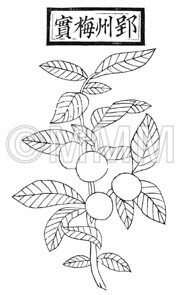Crude drug sample data base
※Click on the image to enlarge it.
The capital city, provincial capital city or the representative
location of its administrative area is indicated.
location of its administrative area is indicated.
Production area information
https://ethmed.toyama-wakan.net/img/pin_san.png
35.8714354
128.601445
Collection information
Republic of Korea,Taegu
https://ethmed.toyama-wakan.net/img/pin_nyu.png
Scientific information data base
| Common name | 烏梅, Wumei, Mume Fructus (Non-JPS2022, CP2020), Processed Mume (Non-JPS2022), Smoked Plum (CP2020) | |||||
|---|---|---|---|---|---|---|
| crude drug image |
| |||||
| Original plant name | Prunus mume Siebold et Zuccarini , (Ume) | |||||
| original plant image |
| |||||
| Family name | Rosaceae | |||||
| Used part | fumed immature fruit | |||||
| Quality for selection | Good one is intense black and has a strong acid taste. It has a thick sarcocarp. (TN) | |||||
| Official compendium | Non-JPS (2022), CP (2020 ed.) | |||||
| Clinical application | Refreshing astringent, antitussive, antidiarrheal drug, expectorant, relieving vomiting, antifebrile and anthelmintic. | |||||
| Medical system | Traditional Chinese medicine | |||||
| Drug effect in traditional medicine | Traditional classification | Astringents and haemostatics | ||||
| Beneficial effect | [Property and Flavor] Neutral; sour and astringent. [Meridian Tropism] Liver, spleen, lung and large intestine meridians. [Actions] To astringe the lung and intestines, engender fluid, quiet ascaris. [Indications] Chronic cough caused by lung deficiency, chronic diarrhea and chronic dysentery, deficient fever, wasting-thirst, abdominal pain caused by roundworm reversal and vomiting. | |||||
| Chemical constituent | Other aliphatic and related compounds (*C1): Succinic acid, Citric acid, Malric acid, Tartaric acid, Ceryl alcohol Triterpenoids (*C1): Oleanolic acid Sterols (*C1): Sitosterol Cyanogenic compounds (*C1): Amygdalin(未熟種子/unripe fruit) | |||||
| Pharmacological effect | Antibacterial (fungus), enhanced secretion of gastric juices. | |||||
| DNA sequence | AF179496, AF179497, AF185616 | |||||
| Classical reference (Chinese Herbal Classic "Zhenglei bencao") |  ※Click this image to see the actual image ※Click this image to see the actual image | |||||
| Disease | Cough, Diarrhea, Roundworm, Hematuria, Irregular vaginal bleeding, Thirst, Anorexia | |||||
| Formulation | Kagenshosaikoto, Kagenhachimotsuto, Kyososan, Junhaito, Jingyobekkoto, Shobaito, Shobaishashinto, Seichuankaito, Bukuryhoshinto, Richuankaito | |||||
| References | Non-JPS2022: The Japanese standards for non-Pharmacopoeial crude drugs 2022. CP2020: Pharmacopoeia of the People's Republic of China 2020 edi. C1) The Encyclopedia of Wakan-Yaku with Color Pictures Vol. I, pp 254-256. | |||||
| Remarks | "Ume" (Jap. name) was brought to Japan in ancient time. It has been used popularly for many diseases. There are 4 kinds of medicinal uses as follows: (1)pickled plum (2)green "ume" and "ume" seed (3)flower and bark (4)"ume" vinegar. | |||||
| Last renewal date | 2022/07/19 | |||||










